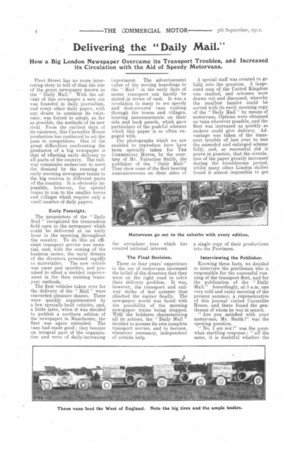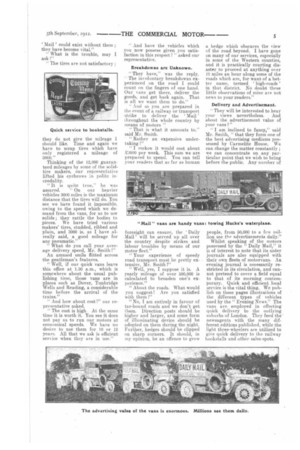Delivering the "Daily Mail. 3 I How a Big London
Page 4

Page 5

If you've noticed an error in this article please click here to report it so we can fix it.
Newspaper Overcame its Transport Troubles, and Increased its Circulation with the Aid of Speedy Motorvans.
Fleet Street has no more interesting story to tell of than the rise of the great newspaper known as the " Daily Mail." With the advent of this newspaper a new era was founded in daily journalism, and every other daily paper, with any, desire to continue its existence, was forced to adopt, as far as possible, the methods of its new rival. From the _earliest days of its existence, this Carmelite House production has continued to set the pace to competitors. One of the great difficulties confronting the producers of a big newspaper is that of effecting early delivery to all parts of the country. The railway companies endeavour to meet the demand by the running of early morning newspaper trains to the big centres in different parts of the country. It is obviously impossible, however, for special trains to run to the smaller towns and villages which require only a small number of daily papers.
Early Foresight.
The proprietors of the "Daily Mail " recognized the tremendous field open to the newspaper which could be delivered at an early hour in the morning, throughout the country. To do this an efficient transport service was essential, and, with the coming of the business motor, the early dreams of the directors promised rapidly to materialize. The new vehicle was surer and speedier, and promised to effect a decided improvement in the then existing trans port methods.
The first vehicles taken over for the delivery of the " Mail " were converted pleasure chassis. These were quickly supplemented by a few specially-built vehicles, and, a little later, when it was decided to publish a northern edition of the newspaper in Manchester, the fleet was again extended. The vans had made good ; they became an integral part of the organization and were of daily-increasing importance. The advertisement value of the moving hoardings to the " Mail" in the early days of motor transport can hardly be stated in terms of cash. It was a revelation to many to see speedy and dust-covered vans rushing through the towns and villages, bearing announcements on their side and back panels, which gave particulars of the push ful schemes which this paper is so often engaged with.
The photographs which we are enabled to reproduce here have been specially taken for TETE COMMERCIAL MOTORI by the courtesy of Mr. Valentine Smith, the publisher of the " Daily Mail." They show some of the fleet bearing announcements on their sides of
the aeroplane tour which has created national interest.
The Final Decision.
Three or four years' experience in the use of rnotorvans increased the belief of the directors that they were on the right road to solve their delivery problem. It was, however, the transport and railway strike of last summer that clinched the matter finally_ The newspaper world was faced with the possibility of the morning newspaper trains being stopped. With the boldness characterizing all its actions, the " Daily Mail " decided to possess its own complete transport. service, and to become, whenever necessary, independent of outside help.
A special staff was created to go fully into the question. A largesized map of the United Kingdom was studied, and schemes were drawn out and discussed, whereby the smallest hamlet could be served with its early morning copy of the "Daily Mail" by means of motorvans. Options were obtained on vans wherever possible, and the fleet was increased as quickly as makers could give delivery. Advantage was taken of the transport trouble of last year to test the amended and enlarged scheme fully, and, so successful did it prove in practice, that the circulation. of the paper greatly increased during the troublesome period, whilst many other. London dailies found it almost impossible to get
a single copy of their productions into the Provinces.
Interviewing the Publisher.
Knowing these facts, we decided to interview the gentleman who is responsible for the successful running of the transport fleet, and for the publication of the " Daily Mail." Accordingly, at 3 a.m. one very cold and rainy morning of the present summer, a representative of this journal visited Carmelite House, and there found the gentleman of whom he was in search.
"Are you satisfied with your motorvans, Mr. Smith ?" was the opening question.
"No, I am not 1" was the somewhat startling response ; "alt the same, it is doubtful whether the Mail ' could exist without them ; they have become vital."
" What is the trouble, may I ask ?"
" The tires are not satisfactory ; they do not give the mileage should like. Time and again we have to scrap tires which have only registered a mileage of 3000."
Thinking of the 12,000 guaranteed mileages by some of the solidtire makers, our representative lifted his eyebrows in polite incredulity. " It is quite true," he was assured. "On Our heavier vehicles 3000 miles is the maximum distance that the tires will do. You see we have found it impossible., owing to the speed which we demand from the vans, for us to use solids ; they rattle the bodies to pieces. We ha-ve tried various makers' tires, studded, ribbed and plain, and 3000 is, as I have alreally said, a good mileage for any pneumatic. , " What do you call your average delivery speed, Mr. Smith?" An amused smile flitted across the gentleman's features.
" Well, if our quick vans leave this office at 1.30 a.m., which is somewhere about the usual publishing time, those vans are in places such as Dover, Tunbridge Wells and Reading, a considerable time before the arrival of the trains."
"And how about cost?" our representative asked.
" The cost is high. At the same time it is worth it. You see it does not pay us to run our motors at economical speeds. We have no desire to use them for 10 or 12 years. All that we ask is efficient service when they are in use." " And have the vehicles which you now possess given you satisfaction in this respect.? " asked our representative.
Breakdowns are Unknown.
" They have," was the reply. The involuntary breakdowns experienced on the road I could count on the fingers of one hand. Our vans get there, deliver the goods, and get back again. That is all we want them to do."
" And so you are prepared in the event of a railway or transport strike to deliver the Mail ' throughout the whole country by means of motors " " That is what it amounts to," said Mr. Smith.
" Rather an expensive undertaking ?"
"I reckon it would cost about :1::3000 per week. This sum we are prepared to spend. You can tell your readers that as far as human foresight can ensure, the ' Daily Mail' will be served up all over the country despite strikes and labour troubles by means of our motor fleet."
" Your experience of speedy road transport must be pretty extensive, Mr. Smith ?"
" Well, yes, I suppose it is. A yearly mileage. of over 500,000 is calculated to broaden one's experience."
"About the roads. What would you suggest? Are you satisfied with them 1"
"No, I am entirely in favour of tar-bound roads and we don't get them. Direction posts should be higher and larger, and some form of illuminating device should be adopted on them during the night. Further, hedges should be clipped on sharp corners. It should, in my opinion, be an offence to grow
a hedge which obscures the view of the road beyond. I have gone on many of our services, especially in some of the Western counties, and it is practically courting disaster to proceed at anything over JO miles an hour along some of the roads which are, for want of a better name, termed 'high-roads' in that district. No doubt these little observations of mine are not news to your readers."
Delivery and Advertisement.
They will be interested to hear your views nevertheless. And about the advertisement value of your vans'? "
" I am inclined to fancy," said Mr. Smith, " that they form one of the best advertising mediums possessed by Carmelite House. We can change the matter constantly ; we can concentrate on any particular point that we wish to bring before the public. Any number of
people, from 50,000 to a few million see the advertisements daily,"
Whilst speaking of the motors possessed by the " Daily Mail," it is of interest to note that its sister journals are also equipped with their own fleets of motorvans. An evening journal is necessarily restricted in its circulation, and cannot pretend to cover a field equal to that of its morning contemporary. Quick and efficient local service is the vital thing. We publish on these pages illustrations of the different types of vehicles used by the " Evening News." The vans are employed in effecting quick delivery to the outlying suburbs of London. They feed the newsagents with the many different editions published, while the light three-wheelers are utilized to give quick delivery to the railway bookstalls and other sales-spots.
























